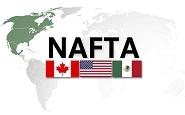Government/Policy

November 15, 2017
Ross: NAFTA Partners Will “Come to their Senses”
Written by Sandy Williams
Canada and Mexico will “come to their senses and make a sensible deal” for NAFTA, said Commerce Secretary Wilbur Ross at The Wall Street Journal CEO Council on Thursday.
Ross defended U.S. NAFTA negotiating tactics, saying Mexico and Canada have more to lose than the United States if the NAFTA agreement collapses. He called a U.S. withdrawal from the agreement “devastating to the Mexican economy” and a “big-time problem for Canada.”
The U.S. team hopes to gain concessions by threatening to withdraw from the agreement that President Trump has called “a disaster.”
Although Ross asserts that the U.S. has significant leverage over its trading partners in the negotiations, U.S. business leaders disagree, pointing to recent expansion of exports from Canada and Mexico to new markets.
The U.S. has put forth several proposals that have met resistance not only from Canada and Mexico, but from U.S industry leaders. Among the more contentious proposals are a five-year “sunset” clause for the agreement, rules of origin favoring the U.S., tighter government procurement requirements, and elimination of dispute settlement mechanisms.
Ross complained to CEOs at the Council meeting about criticism from business and lawmakers regarding the administration’s NAFTA negotiating strategy.
“It’s much better to negotiate anything in a conference room than in an open stadium,” said Ross. “That’s a very big complication.”
He explained that “as one special-interest group—agriculture, for example—gets nervous, they start screaming and yelling publicly. Then Congress people start screaming and yelling publicly, and that just complicates the negotiations. Frankly, it makes the negotiations harder.”
The next round of meetings is scheduled for Nov. 17-21, but some negotiating groups will meet Nov. 15. The ministers representing the three countries will not attend the fifth round, having met on the sidelines of the Asia Pacific Economic Cooperation meeting in Vietnam last week.
Little progress on the more volatile issues is expected during this round of negotiations. A mini-round of talks is scheduled—without the ministers–for Dec. 11-16.







